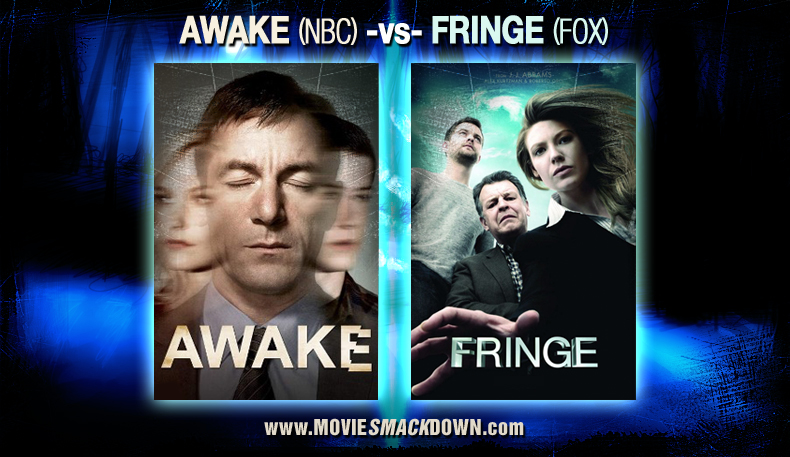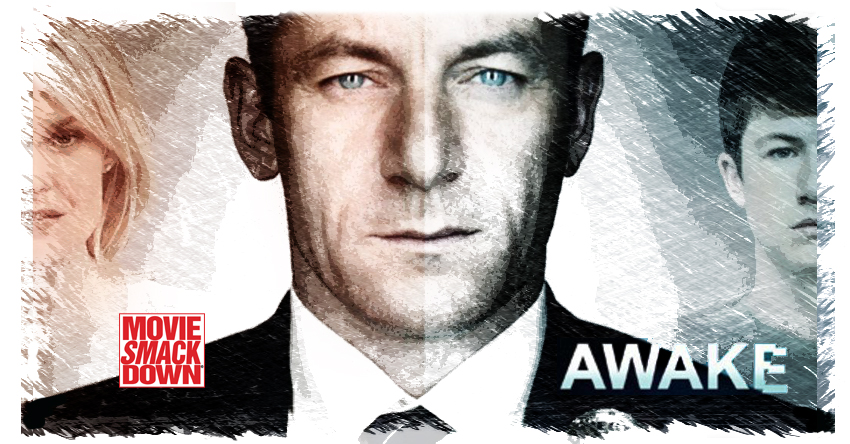
The Smackdown
It’s the lucky ones among us who get the luxury of a “do over,†a chance to take the road less traveled. Poet Robert Frost isn’t the first person to actively wonder what lies on the other side of the life we’ve made. A pair of admired TV programs work that street of possibilities, although maybe not for long.
Let’s touch on the newer and more endangered series first. NBC announced Awake as a mid-season replacement for 2012. This is a cop show with a twist that marks it as a fresh entry in a tired, overplayed genre. Propelled by advance hosannas at the Critics’ Choice Television Awards, the series premiered on March 1 to more than six million viewers, but despite the healthy start, low ratings may put Awake to sleep before it gets a shot at Season 2.
Squaring off against Awake is Fringe, which Fox just announced it is renewing for a final thirteen-episode season, its fifth, after which it will be exiled to a parallel universe known as syndication. Even though Awake is a cop show and Fringe is science fiction, they have similar appeals: Protagonists seek clarity from paranormal confusion that affects them personally, triggered by the death of family members.
With Fringe, the protagonist is a scientist pulled from a mental hospital amid a rising storm of unexplained phenomena for which he bears some responsibility. The stakes are extremely high: existence or planetary destruction. The crisis facing the main character in Awake is different, but potentially destructive in a highly personal way. It stems from wildly shifting, troubling uncertainties in his day-to-day life. His coworkers and the police psychiatrists he’s required to see spread the confusion even further, offering few satisfying answers. Reality is an elusive, moving target on both shows.
Central to this Smackdown: Which series has the better handle on the do-over needed to redeem its central character, not to mention its creative team. (Awake’s creator Kyle Killen explored a similar double-life premise on Lone Star a while back. The standard-bearer in the genre is probably Lost, whose driving force, J.J. Abrams, co-created and runs Fringe.) Each show’s protagonist wants a better hand than fate has dealt. Can the eccentric scientist go back and save the universe and his peace of mind? Can the police detective save himself?
 The Challenger
The Challenger
Conflicted cops are nothing new on TV, but Detective Michael Britten (Jason Isaacs) takes this to another level. If anything, Awake may not be groundbreaking so much as a respite from the unrelenting shooting, rough talk and formulaic plotting that color so many cop shows. The guiding premise of Awake has Britten surviving a horrific car accident. His wife, Hannah (Laura Allen), and their son, Rex (Dylan Minnette), are riding in the car. In one version of two competing realities that forever fight for dominance in Britten’s traumatized brain, Hannah survives the accident but Rex does not; in the other, Hannah dies and Rex lives. Britten exists in one world when he’s awake and another when he sleeps, and both are equally real to him.
In each life, Britten visits a different shrink, each of whom argues that his/her world is real and that Britten has concocted the alternate version to keep his familial relationships nearly intact. Interestingly, Britten has no desire to be “curedâ€; he doesn’t want to let either reality go. This creates complications at work, where Britten uses clues developed in one world to help him solve cases in the other—a premise that he can’t share with his colleagues without being judged emotionally unstable and suspended.
It’s a sort of earnest dramatization of the old joke quoted in Annie Hall about the guy who thinks he’s a chicken. His brother knows he’s crazy but can’t turn him in because they need the eggs. Britten may be crazy too, but he can’t tell anyone he’s using information gleaned from two competing realities, because he needs the clues.
 The Defending Champion
The Defending Champion
We’ve had four seasons of getting to know Dr. Walter Bishop (John Noble), institutionalized for nearly two decades. He and research partner William Bell follow an inquiry described as fringe science. They discover a parallel universe, but the acclaim that follows comes at a fearful cost, and neither can leave well enough alone. When Bishop’s son dies, he crosses to “the Other Side†and kidnaps his son’s double, throwing the cosmos out of whack. Bell makes matters worse by helping get Bishop committed and using his knowledge of the parallel universe to enrich his technology firm, Massive Dynamics. Bell crosses over so many times it destroys him.
On a different track, FBI agent Olivia Dunham (Anna Torv) needs Bishop’s unique background to crack an unusual case. As the series develops, their history together comes out: Olivia was guinea pig in a set of clinical trials conducted by Bishop. She has him declared the ward of Peter (Joshua Jackson), his reluctant son from the Other Side. Very soon, the results of Walter’s tinkering with the parallel universes begins to manifest. These universes are unstable, and there are bad guys who want to bring them down. Each week we see their hand at work.
Observers can be spotted if you look closely, usually deep in the background of each episode. They come from the Other Side and arrive wearing dark suits, fedoras, shades and thin black ties. Really, they wouldn’t seem out of place on the set of The Blues Brothers, although they provide no music or comic relief. The observers are mortal (during an episode, one dies). They monitor events over here and lend a certain continuity to the series, while adding to the general weirdness. They love spicy food. Their real purpose, apart from commenting on events, is not explained. Along the way, we’re introduced to romantic attachments, hints of buried liaisons, and oh yeah, that alternate universe.
The ScorecardÂ
Awake and Fringe both satisfy on several levels, but both can be confusing to the uninitiated viewer. Awake provides helpful visual cues to keep things straight. Its color tone is warm and reddish in one reality, cooler and blue-gray in the other. Several characters populate these realities separately. In the blue one, which features Rex, Britten works cases with partner Isaiah Freeman (Steve Harris from The Practice); within the Hannah reality, Freeman has transferred out and Britten is breaking in rookie partner Efrem Vega (That ’70s Show’s Wilmer Valderrama). Both partners are meant to keep an eye on  Britten, who’s recovering emotionally from the accident and is not exactly doing by-the-book police work.
Fringe uses different techniques, visual and otherwise, to tell us where we are and who we’re watching. When Walter and Olivia travel to the  other Side and interact with their doubles, the show helps us keep these doppelgangers straight by referring to them by different, but similar names—Walternate and Fauxlivia. Other characters have the same names on both sides, but different job titles distinguish their identities. The producers also provide a few handy visual cues: different colored hair, altered personalities, different settings for those familiar faces wandering across the reality divide.
Both dramas benefit from talented supporting casts: In Awake, kudos go to Laura Allen (Mona Lisa Smile), Harris, Valderrama, B.D. Wong, who played a different police psychiatrist all those years on Law & Order: Special Victims Unit, and Cherry Jones, much more convincing as the other shrink than she was as the president in 24. The show is smartly written and requires active watching to follow how the different waking realities alter the events on screen.
Fringe offers a different sort of ride. The larger cast of characters populating the parallel universes allows for more flexibility in developing storylines. Talented support players (Jackson, Lance Riddick, Jasika Nicole) have vivid moments. Anna Torv gives off a slightly damaged vibe as Olivia/Fauxlivia that feels like a natural fit with John Noble’s Walter/Walternate. But ultimately, just as Isaacs dominates Awake, Fringe utterly belongs to Noble. His character is funny, aggravating, thoroughly eccentric and keeps the storyline from drifting out of orbit. You never lose sight of Walter’s regrets, which drive him to kidnap his son’s stand-in from the Other Side, and set loose a sequence of events that may destroy the world. Unraveling the paranormal story twists will remind viewers of episodes from of The X-Files and Lost, co-creator Abrams’ previous series. There are even echoes of the movie Altered States, whose female lead, Blair Brown, has a continuing role in Fringe.
The Decision
This Smack presents a dilemma. Awake is smart and intriguing, but could be cancelled shortly after you read this. Fringe is barreling toward its final, abbreviated season. Both should be remembered long after you’ve moved past the junk gumming up the bandwidth on your cable. Awake suffers in this comparison from its short timeline. I’d like it even more if I could live with it longer. We may never know, in this universe, if Awake can find a consistent voice and a way to keep telling compelling stories for years. Our winner, Fringe, has already done so.







I haven’t watched many episodes of Awake, but Fringe has been my favorite television show since season 1. I always saw Olivia as the protagonist, but I like how this article describes how Walter steals the show. His insanity, brilliance, and regret makes him the most interesting and enjoyable character to watch, in addition to his obsession with candy. Very good article.